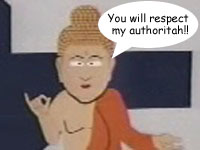
I came across
this article which ties in nicely with what I said in my earlier post
The Face of God with regards to the duality between two views or aspects of the concept of
God.
The concept has two aspects (one of which in Christianity has three faces - the Holy trinity). Some theists see God as having one aspect or the other, while most Churches see one as a manifestation of the other. The two aspects of God are:
Anthropomorphic
This is the more familiar concept of a personal God who feels, thinks and acts, who creates, who is jealous, who forgives, who smites enemies and who impregnated a virgin. This is similar to the polytheistic view of a personified deity as a powerful and manifested being which is 'in the world'. In Christianity, God manifests in three ways known together as the Holy Trinity - the Father, Son and Holy Ghost.
Transcendent
This is the mystical view of God as the ineffable, unknowable, deepest source of reality, and which in some interpretations equals the sum total of existence.
As
'The All' God would appear to be indistinguishable from the deepest principles of physics (and/or the source of them if physics is a manifestation of something deeper). Some theists adhere to this view of God alone. Advocates of such a view include the philosopher
Spinoza. The
Vedantic school of Hindu philosophy sees
Brahman in a similar way as
the ground of all being.
Interestingly, this concept of - and mystical experiences of - this
All or
Ultimate seem to be the place where all religions meet. The differences are in the metaphysics produced in the act of interpretation. Even poly-theistic religions tend to have a more abstract 'greater god' of some sort, of which all other gods are manifestations. Non-theistic religions and philosophers have similar ideas, for example, the concept of
the Tao and Buddhist concepts like
Dharmadhatu.
Schopenhauer's concept of the
noumenon is also related. The linguistic philosopher
Wittgenstein 'talks around' a reality which cannot be spoken of: "
What we cannot speak about we must pass over in silence" and went as far as giving a positive endorsement of mysticism "
Feeling the world as a limited whole -- it is this that is mystical"
Some scientists such as have similar holistic but non-theistic concepts of the cosmos, which border on or even embrace the mystical.
A human being is part of the whole called by us universe , a part limited in time and space. We experience ourselves, our thoughts and feelings as something separate from the rest. A kind of optical delusion of consciousness. This delusion is a kind of prison for us, restricting us to our personal desires and to affection for a few persons nearest to us. Our task must be to free ourselves from the prison by widening our circle of compassion to embrace all living creatures and the whole of nature in its beauty.. We shall require a substantially new manner of thinking if mankind is to survive.
Einstein
When Hawking occasionally talks in terms of God it seems to be more in terms of a hypothetical omnipotent creator being.
And in their quests for a single unifying theory - and as a result of their research - scientists aknowledge the 'oneness' of phenomena, although this is a unity which is generally believed to be physical from top to bottom since, although science does not depend on it, there is to a large extent an unchallenged acceptance of the metaphysical philosophy of
Physicalism (also misleadingly referred to as
Materialism). Also this unity is to be understood primarily conceptually and mathematically rather than realised existentially.
The view of God as a symbol for the ineffable unutterable deepest reality or source of reality is easier to defend philosophically because such an 'entity' is being described largely in negative terms - it is that which cannot be spoken and about which therefore no claims can be made. Interestingly such a view of God (as the linked article above indicates) is that of a being which cannot truly be said to exist, since the transcendent cannot belong to the set of things that exist.
Some Jewish, Christian and Muslim Medieval philosophers, including Moses Maimonides and Pseudo-Dionysius, as well as many sages of other religions, developed what is termed as Apophatic Theology or the Via Negativa, the idea that one cannot posit attributes to God and can only be discussed by what God is not. For example, we cannot say that God "exists" in the usual sense of the term, because that term is human defined and Gods qualities such as existance may not be accurately characterized by it. What we can safely say is that God is not nonexistent. Likewise God's "wisdom" is of a fundamentally different kind from limited human perception. So we cannot use the word "wise" to describe God, because this implies he is wise in the way we usually describe humans being wise. However we can safely say that God is not ignorant. We should not say that God is One, because we may not truly understand his nature, but we can state that there is no multiplicity in God's being.
SourceCompare these statements with the negative philosophy of Buddhist philosophers such as
Nagarjuna.
Neither from itself nor from another, Nor from both, Nor without a cause, Does anything whatever, anywhere arise.
Nagarjuna
In the Midhyamakakirikis, Nagarjuna attacks this attempt to absolutize Buddhist praxis by utilizing a system of logic that offers negative responses to four possible alternatives. Called the catuskoti, it is often depicted in the following form:
1. It is not the case that x is Ø.
2. It is not the case that x is not-Ø.
3. It is not the case that x is both Ø and not-Ø.
4. It is not the case that x is neither Ø nor not-Ø.
Nagarjuna uses this fourfold logic against a whole series of arguments ranging from causality, the self, the aggregates, production, destruction, permanence, impermanence, space, time, motion, and so forth. Against a particular view of causation, for example, Nagarjuna applies the catuskoti and concludes that dharmas (x) are not produced (Ø), not non-produced, not both, and not neither. Or, against a particular view of motion, he applies the dialectic and concludes that motion (x) is not moving (Ø), not non-moving, not both, and not neither.
source"Nagarjuna (c.150-250 CE) ... realized at a profound level the difficulties of carrying out Buddhist discourse in the medium of language, and the degree of attachment that could occur with even such subtle concepts as shunyata. Therefore he endeavored to prevent people from falling into the error of attaching to Emptiness as a "something" or as "non-existence."
He made his project an exercise in consciousness that sought to free people from being limited in thought by the linguistic options of "this or that" and "existence or non-existence." He did this by taking Buddhist philosophical terms and putting them into his formula of "neither x nor not-x." According to this formula, existence is "neither empty nor not empty," "neither samsara nor nirvana." Nagarjuna's teachings are not something new ontologically speaking, but were developments toward a more advanced logical form that can be seen in his Madhyamaka-karikas.
sourceIn these texts, he strove to stop the reification of the concept of emptiness by: (1) stressing the non-difference between emptiness and dependent origination; (2) by emphasizing the understanding of emptiness as a mental attitude which pays attention to the non-attachment to concepts and theories. That is, emptiness should not be made into a theory to be clung to (as are other philosophical and religious doctrines). According to Nagarjuna, he who does so is like "a customer to whom a merchant has said that he has nothing to sell and the customer now asks to buy this 'nothing' and carry it home."For Nagarjuna, emptiness should not be interpreted ontologically, but rather in the way of the parable of the raft: The Buddhist teaching (especially shunyata), is like the raft one constructs for the crossing of a river. Once the river is crossed, the purpose of the raft has been served. It may now be discarded.
The same is true of emptiness: it should not be held on to; one who does hold on to it will have trouble functioning in life. In this sense, emptiness could also be compared to a laxative: once the obstruction has passed, there is no need to continue taking it. Nagarjuna wrote extensively, and his teachings resulted in the formation of an Indian school called Madhyamika or the "Middle Way School."
sourceHaving their ineffable and speaking it
When debating with theists I tend to find that they oscillate between these two positions. God is treated as an existent thing in many ways - as an existent person - a moral agent with human-like attributes who performs acts and who has feelings and thoughts. This is the entity that proclaims the moral absolutes which theists use as justification not only for changing their own behaviour but at times for oppressing others and for acts of violence, in other words this is the 'fully knowable' God that enters the political arena.
When challenged about apparent contradictions in the supposed attributes of God or conflicts between those attributes and His behaviour theists often retreat their God into a 'cloud of unknowing' a place of free-form mysticism where paradox is not only permissable but a defining, positive sign of God's transcendent divinity.
Is this so different from the non-rationality of Buddhism, for example, the paradoxes of Nagarjuna or of Zen koans? I hear you ask.
Buddhism (correctly understood) does not claim to be or have an absolute truth, it can only ever be a finger that points at reality, which is ineffable. Buddhism is a provisional 'skillful means' and thus its attempts to influence the political, scientific or intellectual spheres are likely to be less absolutist and more tolerant. A Japanese Buddhist cleric historically explained the virtual absence of conflict between Zen and other sects as being due to it having no doctrine at all.
Many theists on the other hand want to have their cake and eat it. They want a God who is mysterious, transcendent, unknowable and unspeakable, yet will provide absolute support for their moral and metaphysical pronouncements. How do they get away with it? In Christianity, God is traditionally described in terms of the Trinity - the Father, the Son and the Holy Spirit are manifestations of God, which is nevertheless described as a unity and as 'infinitely simple'. This infinitely simple and unchanging being is supposed to be the active, willful source of all the complexity there is. It seems to me that only through a mixture of blind faith and a sort of mystical agnosticism that such a contradictory nature seems to be acceptable. These are the sorts of statements that I've heard from theists on this matter:
'God is unknowable and anything is possible with God.''I see and how can you know that?''It is possible to have partial knowlege of God''If you don't know what you don't know then how can you know what you know?''I just know.'It is in this way that Christians emerge from their own 'cloud of unknowing' to make oh-so-confident proclamations about the nature of God and His will - to declare what is right and wrong, what is true and every so often to smite their own enemies or justify such actions.
Personally I don't have knowledge or experience of anthropomorphic or any other sort of deities and I tend to think that the ineffable is better handled by the likes of Wittgenstein
"What we cannot speak about we must pass over in silence" and by concepts of the
Tao and Buddhist concepts of Dharmadhatu and
Sunyata, since the 'emptiness', relativity and provisional nature of these concepts is pre-built, well-defined and well-accepted. It's interesting to note also that neither of these indicators of the ultimate is, correctly understood, transcendent since they refer to reality itself.
In my view God is the Tao, misunderstood and as we know
The Tao that can be told of is not the eternal Tao;
the name that can be named is not the eternal name.










